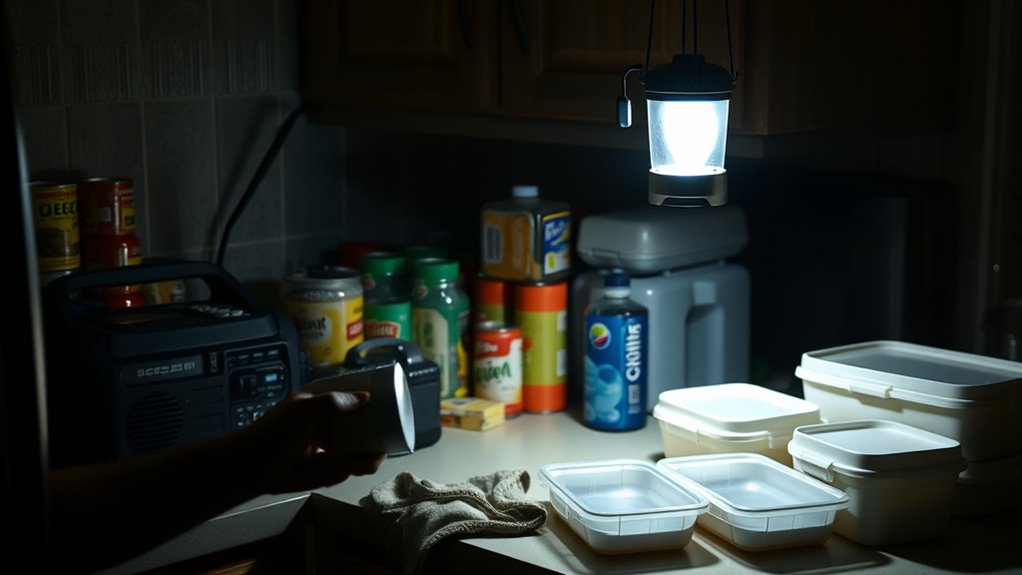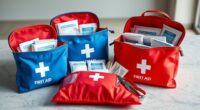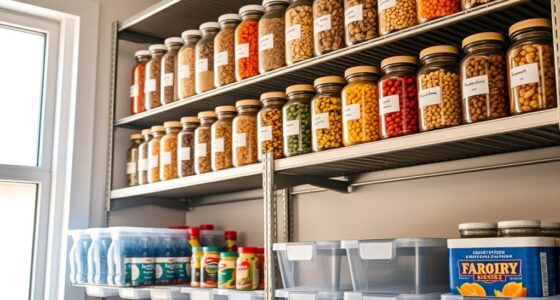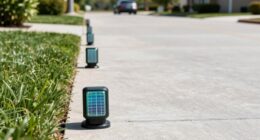To prepare for a power outage, invest in a solar generator and keep an emergency kit with water, non-perishable food, and supplies handy. Keep fridge doors shut to preserve food, and use coolers or backup power if needed. Regularly check expiration dates and maintain your supplies. Staying organized and knowing how to manage your food safety will help you stay healthy and comfortable. Continue exploring tips to boost your readiness and protect your household during outages.
Key Takeaways
- Invest in a solar generator to provide silent, eco-friendly backup power for essential devices during outages.
- Keep refrigerator and freezer doors closed to maximize cold food preservation and know how much time frozen food remains safe.
- Stock an emergency kit with sufficient water, non-perishable food, and supplies, rotating items regularly for freshness.
- Use coolers with ice or portable freezers powered by solar generators to extend the safety of perishable foods.
- Prepare your home and household with plans for extended outages, including entertainment options and health safety measures.

Have you ever experienced a sudden power outage and wondered if you’re fully prepared? It’s a common situation that catches many off guard, but being ready can make all the difference. One of the most effective ways to guarantee you have backup power is by investing in a reliable solar generator. Solar generators harness sunlight to produce electricity, making them an eco-friendly and quiet alternative to traditional gas-powered generators. They’re perfect for powering essential devices during an outage, such as lights, phones, or even small appliances. When selecting a solar generator, consider its capacity and how many devices you might need to run simultaneously. Pairing it with a well-stocked emergency kit ensures you’re ready for a range of situations, providing not just power but also crucial supplies like batteries, flashlights, and first-aid essentials.
Your emergency kit should be extensive and easy to access. Include enough bottled water, non-perishable food, and basic cooking supplies to last at least a few days. Think about storing a manual can opener, so you can access canned goods without power. It’s also wise to pack warm clothing, blankets, and hygiene products to stay comfortable and healthy. Remember, during a power outage, food safety becomes a critical concern. Keep your refrigerator and freezer doors closed as much as possible to preserve cold air. A full freezer can keep food safely frozen for about 48 hours, and a half-full one for roughly 24 hours. If you notice that the power won’t be restored quickly, consider transferring perishable items into a cooler with ice or using your solar generator to power a small portable freezer, if available. Additionally, understanding projector technology can help you optimize your home setup for entertainment during extended outages.
Planning ahead also involves knowing how to manage your food and supplies. Regularly check expiration dates on your emergency provisions, and rotate stock to keep everything fresh. Make sure your emergency kit includes a thermometer for perishable foods and a basic understanding of safe food handling during outages. Having these measures in place guarantees you’re prepared not only for power restoration but also for maintaining food safety and health during extended outages. Ultimately, combining a solar generator with a well-prepared emergency kit empowers you to handle unexpected outages confidently, keeping your family safe and comfortable until power is restored.
Frequently Asked Questions
How Long Can I Store Perishable Food Safely During a Power Outage?
During a power outage, you can typically keep perishable food safe for about 4 hours if your refrigerator stays closed. To prevent food spoilage, avoid opening the fridge unnecessarily, and use ice packs or coolers if available. Remember, refrigeration tips like keeping the door closed help maintain the cold temperature longer, ensuring your food stays safe and fresh longer during the outage.
What Are the Best Portable Power Sources for Emergencies?
Imagine your home without lights or heat—scary, right? That’s why solar generators and portable batteries are your best emergency allies. They’re lightweight, reliable, and can power essential devices for days. Solar generators harness sunlight, turning it into endless energy, while portable batteries provide instant juice. You can charge your phone, run a small fridge, or even power medical devices, giving you peace of mind during any blackout.
How Can I Prevent Foodborne Illness After a Power Outage?
To prevent foodborne illness after a power outage, you should check your food storage. Keep perishable items refrigerated below 40°F and use a thermometer to monitor temperatures. Discard any food that’s been above this temperature for over two hours. Maintain kitchen sanitation by washing hands, utensils, and surfaces regularly. Avoid cross-contamination and consume perishable foods quickly to guarantee safety and freshness.
Are There Specific Foods I Should Keep in My Emergency Kit?
You should include non-perishable emergency snack options like granola bars, nuts, dried fruit, and canned goods in your kit. Use food preservation techniques such as vacuum sealing or storing foods in airtight containers to extend shelf life. These foods stay safe longer without refrigeration, ensuring you have nutritious options during an outage. Keep a manual can opener handy and regularly check expiration dates to stay prepared.
What’s the Recommended Temperature to Keep Food Cold Without Power?
To keep food cold without power, aim for a temperature below 40°F (4°C). Use thermal insulation like coolers and blankets to maintain this chilly challenge. Regularly check food thermometers to guarantee safety, preventing spoilage and sickness. Keep perishable products packed tightly, using ice packs or frozen gel packs to preserve freshness. With diligent dedication to proper temperature tactics, you’ll keep your food safe and satisfying during any outage ordeal.
Conclusion
Being prepared for a power outage means you’re ahead of the game. Keep your backup power sources ready and stock up on safe, non-perishable foods. Remember, a stitch in time saves nine—acting now can save you from bigger headaches later. Stay calm, plan ahead, and you’ll weather any blackout without missing a beat. With these tips, you’re all set to face the dark with confidence and peace of mind.










